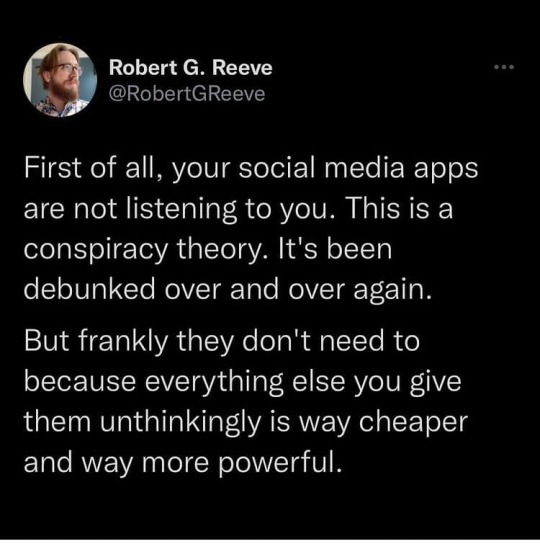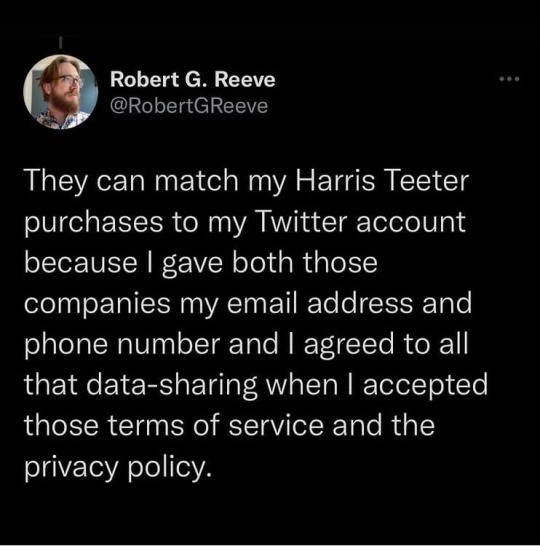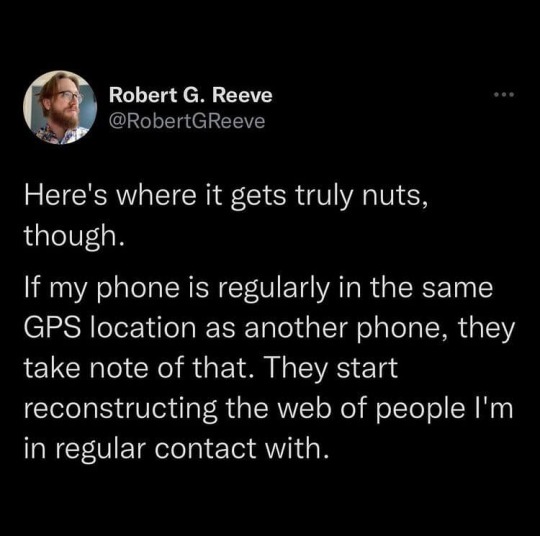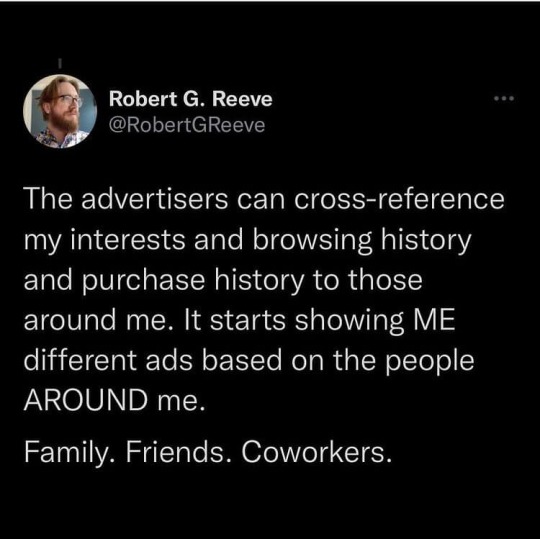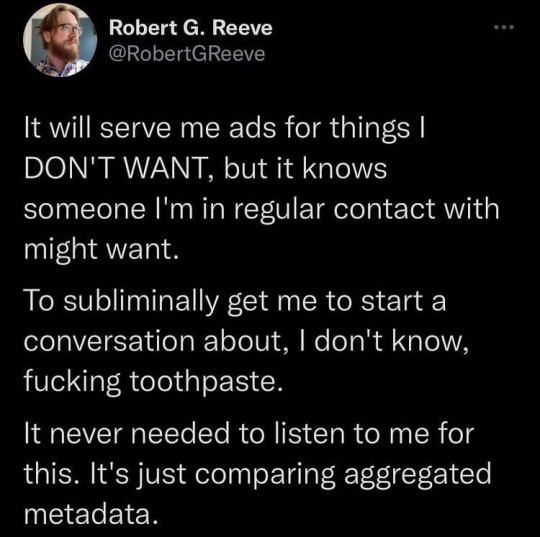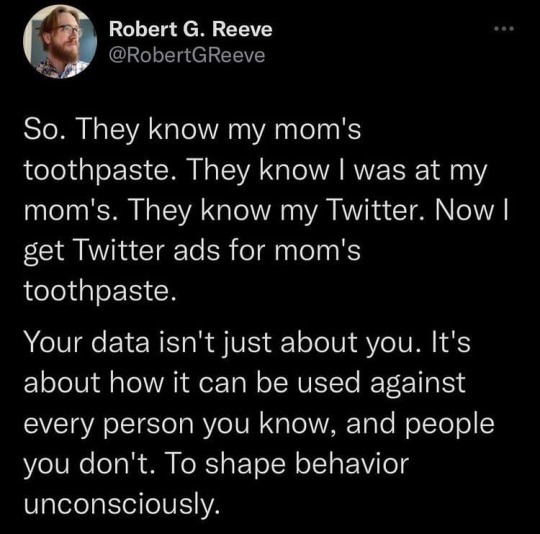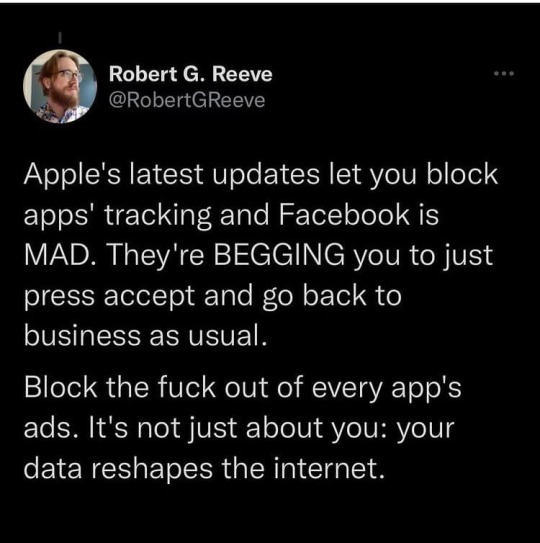Don't wanna be here? Send us removal request.
Text
Yeah, interesting point. Also wanted to add it's just easier to copy something than to take the time to make an original.
I think not appreciating successful works as art can contribute to 'learning strange lessons' from success if you will, but even if the studios appreciated the works as bespoke and unique art, i think they'd still fall into the trap of strange lessons because they don't want to take the financial risk that making an original work might fail.
You see this everywhere, even with really artistic or creative (traditionally anti-spreadsheet) people - instagram accounts are all the time told to "niche down". In other words, get a style and copy stick to it. Twitch streamers, even nice ones, react because filling HOURS of airtime with original thought would be almost impossible to do daily/every other day. Youtubers will milk the shit out of a successful series/type of video before trying anything new (I made 500 of... i spent 5000 hours in... i gave away 500,000 of...) because copying success and tweaking it slightly is a whoooole lot less work than developing another original hit.
So i generally agree, and wanted to add to the statement: even when "capitalism" understands and appreciates art (let's say by making it a hit), it can sometimes work counterproductively to the continued production of good art because copying elements of success is usually easier than making something original and good.
Why the media CEOs will always learn the wrong lessons

Yesterday a friend and I talked about how the entire (AAA) game industrie looked at BG3 being as popular as it is and going: "Oh, we need to produce 100+ hour games, I guess! Those sell!" Which... obviously is not why it is popular. The game is not popular because it has 100+ hours of gameplay, but because it has engaging characters, that are well-acted and that work as good hooks for the players. Like, let's face it: The reason why I so far have sunken 160 hours into this game is, because I wanna spend time with these characters - and because I wanna give them their happy endings.
But the same has happened too, just a bit earlier this year, right? When Barbie broke the 1 billion and every Hollywood CEO went: "Oh, so the people want movies based on toy franchises! Got it!" To which the internet at large replied: "... How is that the lesson you learned from this?"
Well, let me explain to you, why this is the lesson they learn: It is because the CEOs and the boards of directors at large are not artists or even engaged with the medium they produce. They mostly are economists. And their dry little hearts do not understand stuff more complex than numbers and spread sheets.
That sounds evil, I know, but... It is sadly the truth. When they look at a successful movie/series/game/book/comic, they look at it as a product, not a piece of art or narrative. It is just a product that has very clear metrics.
To them Barbie is not a movie with interesting stylistic choices that stand out from the majority of high budget action blockbusters. It is a toy movie with mildly feminist themes.
Or Oppenheimer is not a movie to them with a strong visual language and good acting direction. No, it is a historical blockbuster.
And this is true for basically every form of media. I mean, books are actually a fairly good example. In my life I do remember the big book fads that happened. When Harry Potter was a success, there was at least a dozen other "magical school" book series being released. When Twilight was a big success there was suddenly an endless number of "teen girl falls in love with bad boy, who is [magical creature]" YA. When the Hunger Games was a success, there were hundreds of "YA dystopia" books. Meanwhile in adult reading, we had the big "next Game of Throne" fad.
Of course, the irony is, that within each of those fads there might have been one or two somewhat successful series - but never even one that came even close to whatever started the fad.
Or with movies, we have seen it, too. When Avengers broke the 1 billion (which up to this point only few movies did) the studios went: "Ooooooh, so we need shared universe film series" - and then all went to try and fail to create their own cinematic universe.
Because the people, who call the shots, are just immensely desinterested in the thing they are selling. They do not really care about the content. All they care about is having a supposedly easy avenue of selling it. Just as they do not care about the consumer. All they care about is that the consumer buys it. Why he buys it... Well, they do not care. They could not care less, in fact.
So, yeah, get ready for a 20 overproduced games with a bloated 100+ hours of empty gameplay, but without the engaging characters. And for like at least 15 more moves based on some toy franchise, that nobody actually cares about.
And then get ready for all the CEOs to do the surprised Pikachu face, when all of that ends up not financially successful.
Really, I read some interviews yesterday from some AAA-studio CEOs and their blatant shock and missing understanding on why BG3 works for so many people.
Because, yeah... capitalism does not appreciate art. Capitalism does not understand art. It only understands spread sheets.
6K notes
·
View notes
Text
There is no misinformation in the above posts.
Just saw this, wanted to respond.
In case you haven't seen it, linking my in-depth analysis of the CDC decision here for context. This analysis was written before the reblog above (this is only noted to demonstrate that contrary to the above claim, research had been amply conducted prior to posting), and I have put together a response below.
But first, some context to the timing of the reply. In all honesty I considered not replying, because I just saw this and it's been a while since the reblog was posted, but I feel that the claim of misinformation made is quite important to address, if only for casual readers who might think it's true.
So in summary, a reply:
The CDC maintains that they came to a science-based decision of how best to approach the issue of quarantine. That's not what the post challenges, though some do debate it. The point of the post is that they chose to do so in the middle of an outbreak of a novel, though less severe, version of the covid virus (omicron) just after they were notified by a corporation that said the outbreak plus restrictions on working were responsible for a reduction in available staff.
This is TRUE - that happened.
There is no misinformation there, and the point of the post is that people might want to think strongly about why that occurred. Why the CDC, despite being a public health institution, was taking into account economic data at all, let alone staffing shortages. It says WAS taking, and not APPEARED to be taking, due to a direct quote from NBC (top) and Dr. Anthony Fauci (bottom):
NBC: "Dr. Anthony Fauci, President Joe Biden's chief medical adviser, told NBC Nightly News that the new guidance takes into account both public health data and worker shortages."
Dr. Fauci: "On balance, if you look at the safety of the public and the need to not have society be disrupted, this was a good choice."
That's the CDC. No misinformation, just their words.
To your point about 5 days of quarantine and 5 days of masking (which I addressed in great detail in my linked analysis post), I summarize my view as follows, first addressing directly the assertion regarding misinformation:
"This post has done more damage in spreading the misinformation that the only requirement for covid patients is 5-day isolation". The post never said this. What was said was that the CDC shortened the number of quarantine days [from 10] to 5.
This is TRUE.
The CDC has always been in support of masking when in indoor spaces where you could be in close contact to other people while Covid is around (with some asterisks about vaccinated families at Christmas dinner), sick or not, vaccinated or not. Masking is absolutely a requirement in the updated guidelines, but the major shift in the guidance was to shorten the quarantine - that is, the difference between the guidance before and after the update was that from days 6-10, now you can work.
To be clear: the guidance was not about testing negative for Covid (that is, being Covid-free). It was about the ability to work while having Covid, using "symptom-free" as a proxy for "not infectious" (even though they are not the same). It was about the ability to work while sick.
To quote Dr. Fauci again:
"[people should]... wear a mask for the rest of the time [sic, 5 days], so you can keep people safe from getting infected from you if you still are infected (emphasis mine), but at the same time, getting you back to what might be an essential function in society."
Call me crazy but I think people should be able to stay home the entire time they are sick with anything, and Covid in particular, not just the first half.
Further, and pardon the reliance on anecdotes here, if you've ever been sick, you know that just because you're not sniffling anymore or your fever has broken doesn't mean you feel well enough to work. Nevertheless, with the CDC guidance, employers now had the means to require workers to return to in-person operation before they felt safe to do so. In addition, no negative test was required to return - you could be covid positive, symptom free, AND (by their own admission) INFECTIOUS and back to work as long as you were masked, pushing the onus for public safety onto people's good will to mask up effectively (tight mask, nose and mouth covered, etc) - in a political climate where anti-mask sentiment was not only present but high.
You only have to go through the replies and tags on this post to see that the foreseeable, obvious result of the guidance - regardless of the intent, science, or wording - is what occurred: people were forced to go back to work sick. Period.
The posts are not about hypotheticals - they are discussing LIVED experiences of that time when the CDC gave corporations - intentionally or not - the ammunition to coerce their employees at a time when we needed the government to stand firm in doing the exact opposite.
The reason we need to think about this is not because anyone is trying to sow distrust in the CDC; rather it is to hold them accountable, to give scrutiny to their actions, or, in the absence of that, inform anyone who is interested about the CDC's (in this case economic) influences (biases?) so they can make fully informed decisions for themselves.
What would've happened if society took a second to learn lessons from Covid and how many people can be taken out by illness at once? What if we tried to facilitate remote work or improve distance learning or lighten the load on emergency systems in times of need? We don't know- because we've been shown that ostensibly, corporate interests can muddy the waters of decision making and force people to operate so that we never have to find out.
THAT's what the post was about. Hope it's clearer now.
TLDR; I didn't "skim at best", and a well-cited, succinct response is not a "rage-post". In fact, I read the CDC posting in its entirety plus external analysis from Dr. Jha and others knowledgeable about the CDC's decision making process, and did a two-part analysis on what I read (which I understand, you might not have known about before you posted). There is no misinformation in the above post, and at any point, I retain my right to post about these matters and voice researched, thoughtful dissent on decisions that affect my life, angry or not.
i think its gross and bad and inexcusable that the cdc says you can end quarantine after day 5 of covid. omicron infections last 8-10 days on average. day 4-5 is the peak. it’s just fully not okay for covid-positive people to be wandering around and working and infecting others. im not blaming the people who don’t have a choice but to follow it. i don’t want you to get fired. this one is on your employers and on the cdc for giving shitty ass guidance that is not based in science but rather based on the fact that last winter’s covid wave was so severe that they were worried that if we let people quarantine until they tested negative that we wouldn’t have enough of a workforce to run society. regardless of the validity of that we are not at that point right now.
otherwise reasonable people are following this guidance and it’s really upsetting to see. people close to me have gone to coffee with their friends or voluntarily back to work while actively covid-positive because they diligently looked up the cdc guidance and that’s what it said.
im just so fucking tired.
6K notes
·
View notes
Text
note: spoilers
As I did for Squid Games and Alice in Borderland, I am going to jot down my thoughts about One Piece Live Action, which turned out to be an overall good watch, even though I was /genuinely/ afraid it would suck.
OPLA had big shoes to fill, as the One Piece IP is quite well known and beloved. In my view, the Netflix show understood where it could bring a unique perspective, which helped the execution greatly. For example, the speed, superhuman movements, and over-the-top expressions of the anime would be a stretch to represent accurately in live action; even with cgi, I struggled to feel the epic nature of the devil fruits or fighting abilities being used to their full effect (the initial fight against Captain Alvida, for example). Instead, I enjoyed when the show leaned into amplifying the setting of the world and emotions of the characters, which was amazing! The grime of Alvida's ship, Luffy's backstory on Dawn island (the young!Luffy casting was spot. on.), watching Usopp try to load a cannon for the first time, the exploration of what Zoro and Nami talk about when they're not keeping the captain out of trouble - in my opinion, these were the moments that shined brightest for the show.
Pacing. If you've sat through 1000+ episodes of the anime as many have and felt the buildup of tension over /years/, the treatment that the show gives some plot points can feel frustratingly brief. Sanji's goodbye at the Baratie was not half as emotional as it was in the anime, and the moments when the crew was supposed to band together (e.g. feet on barrel on the Going Merry) felt less impactful because we hadn't had as much time to be endeared to the Straw Hat Pirates and root for them as a group. (For example, if the show had included Morgan's backstory of cruelty from the anime, his defeat would have felt farrrrrr more satisfying). However, I have to acknowledge that rapid pacing is expected in the live action, because the anime is decades old and OPLA has to condense a lot of material into a reasonable run time; for an eight-plus hour series, it managed to rarely feel slow (though it did happen), and that's a feat.
Characters. Koby was perfect. The right amount of nervous, the right amount of ambitious. Buggy was a revelation. His character is kind of a running joke in the anime, so I was ready to wish him off screen as soon as he appeared, but I loved Ward as Deke in Agents of S.H.I.E.L.D. and the genuineness he added to Buggy's CLAP FOR ME OR DIE behavior made the performance not just intense but somehow nuanced. Nami asking (after Sanji's wink) if there was something wrong with his eye. Luffy drinking milk while others ordered beer. The adaptations of Hawkeye and Garp. You can just imagine the work that went into the fishmen makeup- the list goes on. As I mentioned, I think this attention to detail in adapting the appearance and interactions of the characters was probably what the series did best. Of course there were... interesting takes (bright neon hair in a world of muted color, Nami turning from dollar-sign-eyes loving money in the anime to eat-the-rich in the show, Nami keeping the secret of her involvement with Arlong from Nojiko) but these differences I think make OPLA its own production - a TV show with its own lore - and leave room for people to go back and watch the anime and fall even more in love with the characters and their deeper stories there.
Helmeppo. Helmeppo is so much. I love the 'let's all shit on Helmeppo' jokes. More. Moarrrrr of this.
Extras. I appreciated all the extra touches like the title screen of each episode being modeled after the focus character of the episode and the wanted posters being half anime half live action; it made the production feel like it was made by people who cared that the adaptation was done right. I loved hearing hints of We Are in the soundtrack, and the den den mushis were toooo cute. Altogether, good stuff for my one piece brain. It helped me get through the scenes of Go with Garp.
TLDR; The interpretations of the characters and the realistic settings were highlights of OPLA. The Going Merry, Kaya's mansion, Morgan's naval base, the Baratie and Arlong Park were all stunning to see in live action. However, while the fight scenes were well made, they didn't quite compete with the heights set by the anime, and the story is really condensed, leaving some heartfelt moments coming off as shallow or leaving them out of the plot altogether. This can be a struggle if you're looking for the intricate, mysterious, multi-layered world from the anime. But those still traumatized from memories of live action atla (2010) or dbz (2009) can breathe a sigh of relief as we hold out for sustained quality for this adaptation in future seasons: overall, OPLA is worth watching. A great introduction for newcomers to this amazing series and a pretty good adaptation for long time fans as well.
8 notes
·
View notes
Text
Since I've been doing some discourse around "the disabled" today, I suppose it's a good time to note that I don't think "the disabled" or "people with disabilities" is really a coherent group from a political standpoint. From a legal standpoint, there's a coherent definition of "disability" in countries with laws protecting the disabled, and these legal definitions do tend to capture some of the brass-tacks essence of what "a disability" is, materially speaking. But that definition doesn't get you very far in activism or politics.
The thing is, by the strict definition, most people ate disabled, if by that we mean "have a disability, as formally defined." Like, you can pretty much assume everyone over 60 and most people over 50 are disabled; everyone who needs glasses or contact lenses is disabled. I would expect it's a significant majority of the population, though I have very much not done the math.
But of course, most of these people don't consider themselves disabled, and wouldn't be considered "really" disabled by others, and crucially, in many cases they're better off being considered "not really disabled." It's not that they have a false consciousness so much as that "disability" is such an expansive category, so varied in both its severity and character, that it doesn't really lend itself to solidarity. Disabled people mostly have one specific problem or a set of closely related ones, and not only do they rarely benefit from help provided to others, but because it's impossible to give everyone adequate accommodations, and people can even have conflicting needs, accommodations to one disability group can be threatening to another. You can get deaf people, paraplegics, and autistic people into a coalition together, but it won't last very long, especially not if it wins enough to start thinking about how to divide the spoils. Sucks for people who are deaf, paraplegic, and autistic, because they sure do exist, and within disability culture they have the same kind of complex status that "intersectionality" was coined to describe.
And so the upshot of this is that I'm skeptical of people who attempt to speak for "the disabled," or cite that status in a standpoint-epistemology way without being specific, or talk about policies that help the disabled as a broad group, because it feels obfuscatory; the formal group is too expansive and diverse to be discussed in those terms, so it tends to read as an appeal to an archetype, an identity, whose relationship to the formal/material concept is ill-defined.
907 notes
·
View notes
Text
Thoughts on the Karl Jacobs thread
Market share may be good for the company, but it’s not necessarily good for you, the customer. I think Karl could do better in being aware of these types of nuances in the future.
On Apr 4 Karl replied to the Twitch Support Twitter account with some thoughts about their announcement that they were going to implement sponsored streams on Twitch.
Karl, in a four-tweet reply thread, stressed that he was “wildly unimpressed” and called the implementation a “malicious and manipulative bandaid solution”, arguing that Twitch should not implement sponsored streams, and should instead focus on growth and market share over profitability. This seemed odd to me, that Karl would suggest that a company as large as Twitch was misstepping by trying to do something so egregious as turn a profit. But it appeared I was in the minority, going by the overwhelmingly favorable replies and quote tweets.
So I made this post. Just to present another way of thinking about this issue :)

Is growth and market share a good thing for a company to hold? Sure, for the company. In fact, increasingly the attitude of startup companies is to ignore profits for longer and longer time periods so they can get exactly that- the lion’s share of a market/user base (think Amazon, Uber). However, we have to remember two things:
There is a real cost (money, and people) to doing business this way
The monetary debt that is racked up has to come due at /some/ point, and users often pay the price
1: The cost of growth - regular companies without large pockets are unable to compete with growth companies, going out of business and leaving all the power in the hands of a few giant corporations
Amazon notoriously operated at razor thin (to nonexistent) profit margins for years. They /purposefully/ sold their merchandise for less than it was worth, operating at a loss specifically so they could put competitors out of business. Diapers.com, Zappos, nearly Barnes & Noble, likely several others that were too small to be mentioned - competitors gone, absorbed, or maimed. Uber purposefully used introductory pricing, lowering their fees to make their inroads into the market, cannibalizing Yellow Cab. All for the sake of growth. Amazon kept its edge by copying real products from real hard working people and making rip-off versions so that they don’t have to do any development work and instead can capitalize on the success of anyone that comes along.
THIS is how growth works - get big, and get big fast, and eff the poor guy who is in the way, even if their product is /better/. (Even if their product is priced the way it is so they can afford to pay their employees!!)
And if this seems too abstract (companies compete all the time, so what?), it’s real to you - the more growth tactics put competitors out of business, the more power the few companies left will hold. And they don’t always use it well.
Have you ever tried to get a hold of Instagram or YouTube if someone falsely flags your post/video? The recommended method (known by large creators as well, even though they have representatives to help them get around it) is not to go through the company’s appeal process, it’s to go to Twitter and AT the company! Ticketmaster, which holds 70% of the ticket market, implements service fees on top of the ticket price (some which go to the venue, some which they take as profit) - and these can be pricey, but if you want to see major acts, you’re stuck!
Market share may be good for the company, but it’s not necessarily good for you. The more power a single corporation has, the less they have to pay attention to any individual customer’s needs, so you’re sol if you have issues with how they treat you - they have a million more users waiting to replace you.
2: Growth companies rack up costs that have to be paid back, and these costs are often passed on to the customer
Growth companies lose money on their products through introductory pricing, (and paying employees and buying server space and and and) but they can’t stay making no profits forever for (at least) two reasons:
a - unfavorable business conditions and
b - competitors with bigger pockets.
A - Not too long ago, a virus no one saw coming impacted the entire world, closing 700,000 businesses in the US alone. These businesses went under because they had no money. It might be ‘annoying’ that Twitch is introducing sponsored streams, but these streams bring in money to help keep the doors open in case any unforeseen events happen in the future. It’s good for Twitch to be profitable, it’s like having a savings account of funds to dip into in bad weather times.
B - Growth companies have to fight /other/ growth companies. Netflix was happy putting Blockbuster out of business... until it met Disney+ and Amazon Prime and HBO Max and and and. Twitch was happy without sponsored streams... until Kick and YouTube decided to push for streaming. These growth companies are fine making no money as long as they’re the biggest fish - they can always milk their users for money later. But the moment they find a competitor who can steal their users and put them out of business, suddenly the scramble is on for cash.
Where does the cash to keep the doors open come from? In some way, shape or form, the user generally has to pay for it. Either they do what Uber did and bring prices back up once they want to turn a profit or they do what Netflix is doing and introduce an ad-based tier/no password sharing, or they do what YouTube did and introduce ads or what Twitch is doing and kill the 70/30 split for their favorites and introduce sponsored streams - eventually all of these companies have to stop eating loses and make a plan for profitability, and that price hike or decline in the user experience will always come after (sometimes years after) they have lured in enough users with introductory rates that no one can meaningfully complain.
So what do we do? And what does this mean for what Karl tweeted?
I think we need to slow the roll with the growth tactic stuff. Profitability is not a bad word (see: Apple). It (generally) means you have a good product/service/idea and it’s selling well. What is ‘malicious and manipulative’ might actually be the way growth companies do business, putting competitors out of commission through unfair pricing. Having to turn a profit might actually force them to /compete/ in the marketplace instead of undermine it.
I think Karl is coming from a good place in trying to speak up for the users and creators of the site, who might get annoyed at having to sit through a sponsored stream or annoyed at having to do them. And that’s fair! We need that kind of advocacy, goodness knows Twitch has issues (low discoverability on the platform, for example). He talks about wanting to keep Twitch from ‘exploiting its creators’ and stop ‘massive layoffs’. That’s great! (You know what might stop massive layoffs? Profits) But the way to do it is not, in my opinion, to subscribe to flawed business methodologies that result in the consolidation of power in the hands of a few corporations at the expense of users.

Instead.
I think what Karl could focus on is advocating that the creators and those who work at Twitch should see a larger percentage of the profits that the company makes. It might be easier to do a sponsored stream or sit through one when you know Twitch is handing over 70% of the revenue to the creator, or that Twitch is using the revenue to support well paid employees and not lay them off in hard times! I think Twitch could consider including creators in the decision making process of the platform whose influence they help to build. Honestly, I actually think Twitch should even look into whether its business model fundamentally is sound when it can be so easily replicated or poached (*ahem* Kick/YouTube *ahem* Ludwig). These are all tough questions that need to be asked.
But it’ll take time to figure them out. And I think it would be nice if Twitch gets a little bit of our support and patience in addition to our skepticism as they try to figure it out.
#karl jacobs#twitch#ludwig#youtube#kick#streaming#streamers#capitalism#platform capitalism#But what do I know 🤷♀️🤷♀️
3 notes
·
View notes
Text
note: spoilers
Commentary YouTuber Pinely (notable for, for example, The MrBeast-ification of Youtube), made a new video called Logan Paul's Consumerist Dystopia which I felt kinda :/ ... about, so I wanted to talk about it here.
youtube
The video is essentially about PRIME, the energy sports drink released by Logan Paul and KSI in Jan 2022. In it, Pinely discusses a number of points that criticize Prime, including how the taste is not as good as one might be led to believe, the fact that there has been a frenzy of purchasing of the drink (like lineups and increased resale value), and the fact that the ads for the drink can be quite embedded. But I watched it and don’t think the video lived up to its claims of identifying a consumerist dystopia, and certainly not one that Logan Paul created.
I say this firstly because, dystopia is a strong word for what is happening with Prime, and secondly because, the idea that Logan Paul created a consumerist dystopia (as opposed to him merely participating in an advertising campaign) makes little sense.
Let’s take each points one by one:
The title. Logan Paul’s consumerist dystopia. He didn’t say “Logan Paul and KSI’s consumerist dystopia”, or more generally, “YouTube’s consumerist dystopia.” He alleged, in the title, that Logan Paul specifically had done something to create a dystopia (with Prime) - that’s a high bar of proof to clear. And imo, the video doesn’t clear it. Instead of giving evidence of Logan Paul masterminding a concerted plan to benefit from consumerism, as the thumbnail might suggest, the video only shows clips of Logan... advertising Prime. We see him walking around some backstage area presenting the launch of the drink, walking through a grocery store where they stock Prime, and doing his job as a promoter of a product he has launched, bigging it up to the camera. Nothing new, nothing not seen in regular commercials on TV. Hardly evidence of him creating a consumerist dystopia. But with commentary and some really brutal editing (Pinely cuts video of Logan advertising Prime with a black-and-white tv commercial), Pinely tries to equate Logan’s quite average pandering of a sports drink to the camera as evidence of his crafting of a consumerist horrorscape (this term is used here because I can’t keep saying dystopia) akin to the Truman Show. In my opinion it’s exaggeration. The worst Pinely can say about Logan’s promotion of Prime is that possibly the love and friendship that is used by Logan and KSI to promote Prime is not genuine. (Maybe they’re not actually good friends). But then Pinely himself admits he doesn’t know whether they’re friends at all, and that it doesn’t matter- they’re business partners, and they’re promoting a drink. So if it doesn’t matter, and Logan Paul did simply promoted his product, why title it Logan Paul’s consumerist dystopia? It’s clickbait at best, and at worst, it’s selectively biased - it purposefully leaves KSI out of the title because KSI, at the moment of writing, is seen in a more favorable light than Logan Paul (and people might be quicker to realize that advertising Prime is not the same as creating a dystopia because KSI is seen as quite ‘hardworking’ broadly speaking, and deserving of his success).
The public reaction. Perhaps the most memorable clips of the video are of the public, where shots are shown of people rushing stores to buy Prime or buying so much at once the drinks in total retail for ~$1000. One couple appeared to pay $300 for (or at least spend that much to get) three bottles of Prime, a value of ~$90, a practice KSI has discouraged. However, instead of the public’s reaction being evidence of consumerism (defined in this context as “The situation in which too much attention is given to buying and owning things”.), all Pinely has managed to show, in my opinion, is evidence that Prime is a trending product. In 1996, it was Tickle Me Elmo, in 2007 it was the Wii, sometimes it’s concert tickets of a popular musician, this time it’s Prime. The crowds were not driven by materialism, the love of having lots of stuff, they were driven by a simple desire to try Prime or support Logan Paul/KSI through Prime combined with a response to scarcity. In other words, desire for a product, even a strong desire, (or strong sales), does not immediately equal consumerism (more akin to the love of buying and having a lot of stuff, for its own sake). What the video shows is regular people showing their support for YouTubers in their latest merch drop or jumping on the bandwagon of trying to get a taste of an item made rare by the number of people who want it. Nothing more.
(****I discussed this with someone, who pushed back strongly on this point that a large group of people wanting something purported to be overvalued /is/ evidence of consumerism, and I want to stress here that just because /some people/ wouldn’t have paid as much for Prime doesn’t mean that it is not right for /other people/ to strongly desire the product and even be willing to pay scalped prices for it- the fact that they are being scalped is not their fault, it’s the fault of those who recognize the demand and upsell the product****)
The advertisement. Pinely argues that Prime gets outsized amounts of free advertising compared to its taste (as distinguished from the quality of the product with respect to its ability to hydrate). Prime is an energy drink that doesn’t taste particularly good, if Pinely and Gordon Ramsey are to be believed. Not bad, but... not good either, or at least not as good as the claims made in the advertising done by other YouTubers. This advertising is often unpaid and can be over-the-top, designed to grab the viewer’s attention to the point where, instead of discussion about Prime having a spot in the middle of the video somewhere as a sponsor, the drink can be the entire point of the video, amounting to something like a 9-minute ad, in the case of (Mr. Beast adjacent) Matthew Beem, complete with stunts like jumping into the Thames river (quite unsafe, as Pinely points out). However, the reason for this behavior is explained within the video, again by Pinely himself: it is not evidence of a consumerist dystopia, they are simply YouTube creators trying to pay the bills, (or, more generously, individuals trying to make money) and they know that jumping on trends accomplishes this by getting views. If the trend was giving money away, they would do it. If the trend was doing a ‘largest of’ or ‘biggest of’ video, they would do that. At that moment in time, Prime was the trend, and to piggy-back on the success of KSI and Logan Paul, Matthew Beem made a video that was completely consistent with his over-the-top style, with countless others providing reviews for the same reasons (content and views). A YouTuber making a video is hardly news, and Pinely admits that he “Doesn’t blame them” [those who jump on trends] for doing it, so... why the alarmist references to a dystopia? And how does another YouTuber (Matthew Beem) independently deciding to create a video to jump on a bandwagon for free have anything to do with Logan Paul?
TLDR; The Pinely video was framed as a type of negative review on Logan Paul and consumerism, but it didn’t provide much evidence of an issue separate from the public’s general excitement about Prime or larger than Logan Paul advertising a product. Nevertheless, the video boasted a thumbnail of a puppetmaster Logan and a title referencing a ‘consumerist dystopia.’ While generally, clips of intense reactions of the public and possibly stretched truth about the taste of Prime were shown, I think the video’s framing might need tweaking or it might not amount to much more than Pinely’s feelings that Prime was getting so much hype.
#pinely#logan paul#ksi#jj olatunji#olajide olatunji#prime#prime hydration#youtube#mr beast#sidemen#matthew beem#james marriott#willne#tietensgo
1 note
·
View note
Text
note: spoilers
As i did for Squid Game, I am going to write down my thoughts about Alice in Borderland and its ending, which I thought was lovely and satisfying, despite my initial impressions.
1. Firstly are the parallels I picked up on*, given the title and character names:
Arisu: Alice
Usagi: White Rabbit (I’m late, I’m late)
Chishiya: The Cheshire Cat
(Danma) Hatter: The Mad Hatter (and the Beach is his teaparty)
Mira: The Queen of Hearts
Kuina: The Caterpillar*
Ann: The Duchess**
*I did not note this one personally, but looked into it and it made sense, given Kuina’s bent for smoking and the transformation from caterpillar to butterfly
**Also didn’t pick up on this one, (and the connection is less obvious to me) but it’s rumoured along with several more about Arisu’s close friends Chota, Karube, and others.
2. Secondly is the unfolding of the plot:
So Season 2 was much anticipated, and was an interesting change of pace from Season 1. We’ve figured out the mechanics of the game now, the ins and outs of visas, game rules, what the suits mean, and the practicalities of the world. The focus shifted more to understanding how the world came about, who rules it, and most importantly, how to leave.
I loved the ability of the show to keep a steady pace that alternated between the mind-bending, sadistic games that still gripped in both conception and visuals (death by sulfuric acid was terrifyinnggggg I couldn’t watch it) and the middle bits, the exploration of character arcs like the romance between Arisu and Usagi, Ann’s exploration of the physical world, or the persistent questioning about the meaning of life.
3. Lastly was the ending.
I must say I initially didn’t like it. I fully appreciated the nod that was given to the most plausible theories at the beginning of the last episode: Is this time travel? Is this some sort of deep brain simulation? IS IT ALIENS??!?! This part of the Episode 8 conversation with Mira showed that the showmakers (author even?), knew that the audience’s mind had been asking these questions almost since the Moment Arisu arrived in Borderland.
Compared to all of these theories though, saying it was a rogue meteor strike was... a let down. BUT. The more I thought about it, the more I realized it could’ve been anything, tbh, that caused them to be transported, because the point is that ANY near-death experience can take you to Borderland, the space between life and death. And it brings to front and center the conversations that each person had been having thus far about the meaning of life. The hypothesis is that when the body is fighting to survive an accident of some sort in the real world, the mind is also doing a sort of ‘Systems Check’, trying to search for a reason to keep going, a purpose for which to exist. And Borderland provides a place for such a battle to take place, a limbo of sorts where people are forced to remember how precious life is and why it needs to be fought for- enough that they get shaken out of their stupor and wake up.
Of course, this is not a perfect solution. Did Chota and Karube die in Borderland because they didn’t think life was precious enough? (No.) And what happens to the physical bodies of those who choose to become citizens? (They die, eventually. Time works differently in Borderland, but even Game Runners don’t appear to live forever.) I don’t purport to have every answer. I just mean that... by all accounts, /everyone/ affected by the meteor could’ve died. (It was a meteor, which a huge explosion!) But Borderland took the consciousness? souls? of the dead people there and provided a way for /some/ of them to live.
If you look at it that way, Borderland, despite the random death games and constant terror, actually /reduces/ the number of people who die from a mass-casualty event, and, makes sure that, of those that come back to life, most of them are determined to live life to the fullest when they get back.
ALSO, in the Netflix version, we see that the last shot is of a player with a Joker card. This is expanded on a bit more in the manga, but basically he’s some sort of limbo-esque character, giving credence to the idea that Borderland is a last-chance type of world, where, if you fight hard enough, and convince enough people to try with you, and hold on to hope long enough, you can earn one last chance to be returned back to the real world and live.
TLDR; Alice in Borderland Season 2 did not pull any punches with the games, which were as visceral and heart-pounding as ever. I personally enjoyed discussing extensively with my watch-mate about how we would approach each game, and loved seeing the details of the Alice in Wonderland characters woven into the narrative so well. The ending was at first disappointing, but the more I thought about what the Borderland represented, the more appropriate the ambiguity became, and eventually I could accept Borderland for what it is: a train station between the real world and the afterlife, where people fight for the opportunity to go board the train back to the real world and live.
#alice in borderland#netflix#arisu ryohei#chisiya shuntaro#usagi yuzuha#ann rizuna#kuina hikari#tietensgo
17 notes
·
View notes
Text
i saw the avatars on instagram and i went oh CUTE! for five seconds and then was like... but it’s made by meta... :(( and now they’ll have a representation of my effing face... i noped out of that and just felt a bit :/ afterwards. like it’s a cute idea but i don’t trust you???
Hey, do y’all remember how Tencent said they were developing faceID AI to identify people in riots, and then they suddenly created an AI art generator to turn your selfies into anime?
Do y’all remember that time that someone discovered facial recognition cameras couldn't see through Juggalo makeup, then Facebook had a fun “see what you'd look like with Juggalo makeup” thing, and then facial recognition cameras could suddenly see through Juggalo makeup?
Do y’all remember how, on Twitter, Elon started a tirade against artists who ask for credit when their art is reposted, and he suddenly he created one of the first big art AI programs?
Do y’all remember how AI destroyed the field of translation, despite the inferiority of the machine translations, because people didn’t care about the quality of the translations? They just wanted it done for free?
Do y’all know how companies will see a lot of money going into a New Tech Thing (like, say, AI art apps) and will jump to try and implement that New Tech Thing into their tech? For example, how it felt like every big company and celebrity had an NFT to sell?
Just wondering.
#don't use the filters#don't use the eye and fingerprint scans#don't use them don't use them#don't use ai#avoid captcha if you can#idk even if they're fine i just feel ickyyyyyy#this is admittedly a not v researched take#it's just a feeling rn
107K notes
·
View notes
Text
As much as I want to support ethical farming practices I will be buying the cheapest bag of frozen chicken thighs as much as the next frugal/poor person which is why animal welfare needs to be legislated, not left up to the invisible hand of the free market or some bullshit. Invisible hand of the free market finds itself around a lot of throats.
#tell me how capitalism itself is at fault#there was just a lengthy discussion about how it’s how the implementation occurs#that allows systems to bloat past intended use#someone please explain
125K notes
·
View notes
Text
If the HBO Max shitshow teaches us anything at all, it should be that when it comes to streaming media, media piracy is media preservation.
Physical media is harder to erase. Download your favorite animated shows today. Burn that shit to DVD and share it with your friends. If the corporations won't produce physical media, it's up to us to do it ourselves.
Streaming exclusives are the enemy of media preservation and archiving. Nothing should be lost just because corporations don't respect the art they own. When piracy is the only option, it becomes vital to pirate, lest things get lost forever.
There are instances of lost media being found again because someone home-taped it. The torrent you seed, the episodes you download, could one day be the only reason your favorite streaming show wasn't lost forever.
Art is being destroyed. Workers are being exploited and abused. And at the end of it all, what's there to show for it? Nothing, because HBO Max is setting the precedent that you can just delete whatever you want, whenever you want, and not even tell the artists.
Animation workers aren't being respected as artists OR as workers, and shit like this is a perfect example.
#I don’t agree with some of this#most actually#but the physical media is important part is… important
51K notes
·
View notes
Text
six days after Delta airlines informed the cdc about an employee shortage and wanting their employees back, the cdc quickly came to an unrelated consensus that the number of days of quarantine should be shortened to 5 days
i think its gross and bad and inexcusable that the cdc says you can end quarantine after day 5 of covid. omicron infections last 8-10 days on average. day 4-5 is the peak. it's just fully not okay for covid-positive people to be wandering around and working and infecting others. im not blaming the people who don't have a choice but to follow it. i don't want you to get fired. this one is on your employers and on the cdc for giving shitty ass guidance that is not based in science but rather based on the fact that last winter's covid wave was so severe that they were worried that if we let people quarantine until they tested negative that we wouldn't have enough of a workforce to run society. regardless of the validity of that we are not at that point right now.
otherwise reasonable people are following this guidance and it's really upsetting to see. people close to me have gone to coffee with their friends or voluntarily back to work while actively covid-positive because they diligently looked up the cdc guidance and that's what it said.
im just so fucking tired.
6K notes
·
View notes
Text
Anyway this Twitter thread by NK Jemisin is all I care about
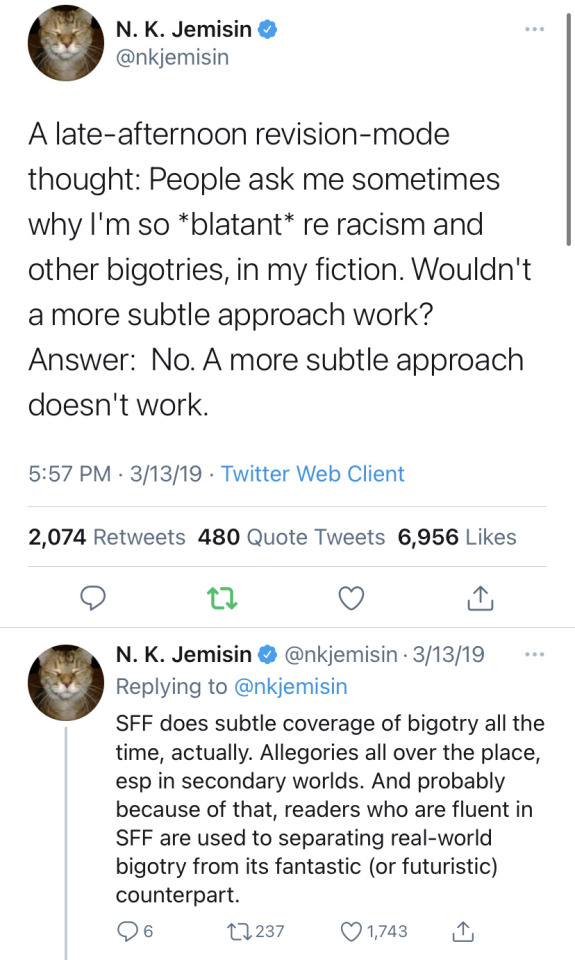
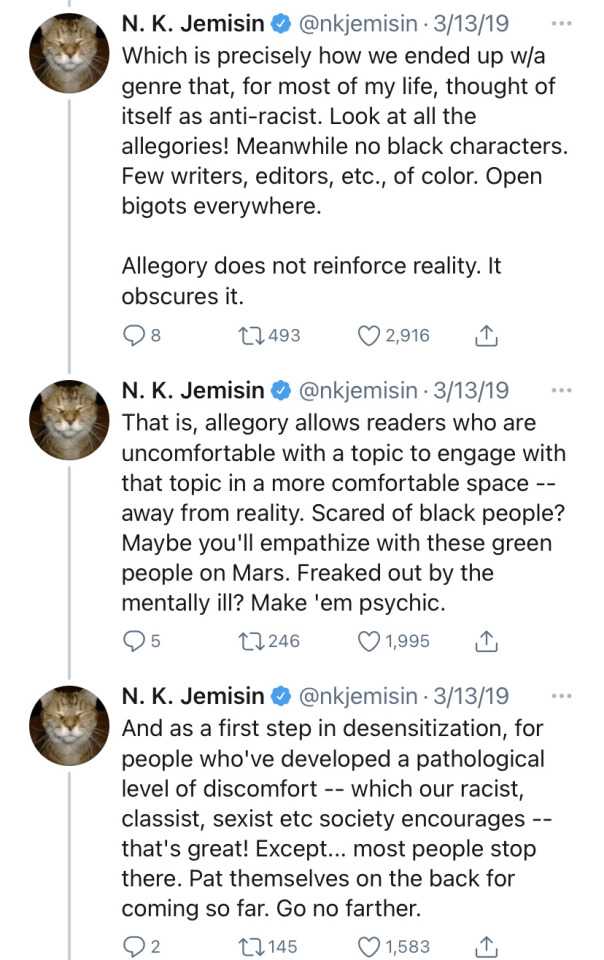


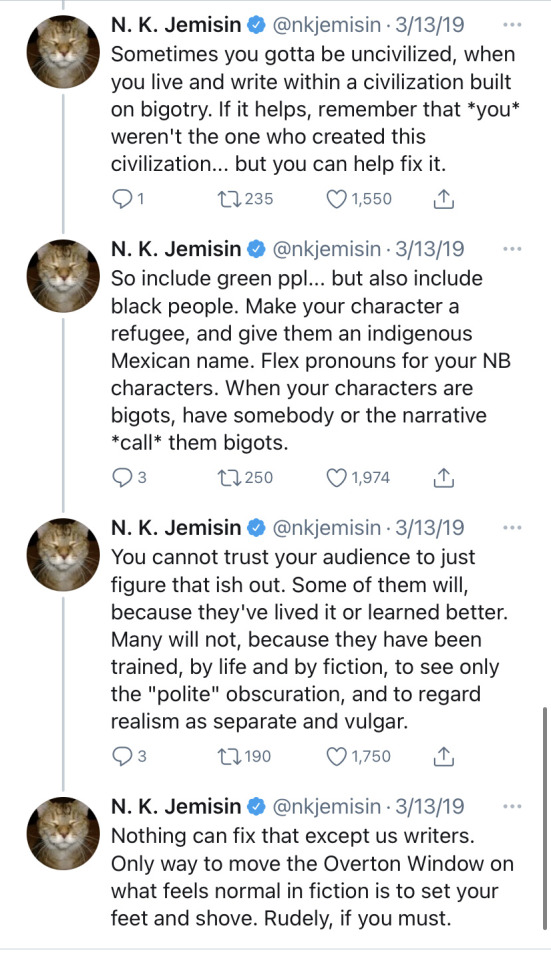
21K notes
·
View notes
Text
:((((((((
i don’t want to draw wild conclusions or be alarmist. but when fauci said ‘as many as possible back to work’ in the midst of omicron in Dec’21 I said these people have given up...
And who is next to her when she says it?? Dr. Jha omgggggg of course it was him i said it i said it :((((((
i don’t want to be right... (be warned the readmore is long)
TLDR; The post, the graph especially, explained where the 5 days comes from and gave context to the CDC announcement. It seems like the new recommendation was motivated by a desire to prevent unnecessary work suspension for people in essential working positions (hospitals, flight attendants, wastewater treatment, etc) due to rules about isolation. But the timing/motivation, to get people back to work in the midst of a Covid surge, makes me feel like the emphasis has moved from trying to stop individuals from spreading Covid in the first place to accepting that Covid is here and working through it (likely to the benefit of economic interests), instead. The conversation is shifting.

ALT
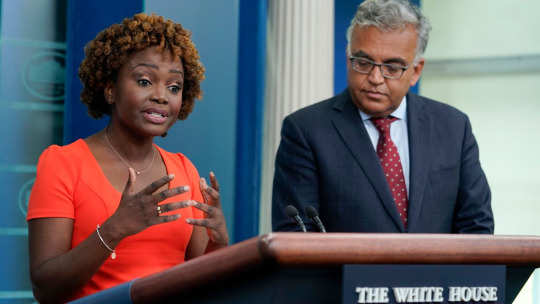
ALT
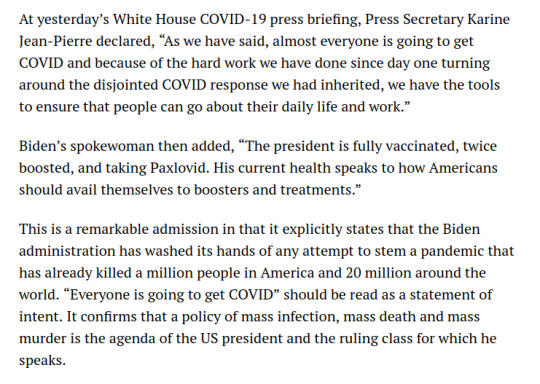
ALT
To put the US position more directly: “Almost everyone is going to get COVID [...] we have the tools to ensure that people [...] work.”
#this is such a weird thing to read#'almost everyone is going to get?'#sorry to make your post longer op#i just... thought people should know that the signs that this is their mentality#have been around for a little bit#in case people were not aware
7K notes
·
View notes
Text
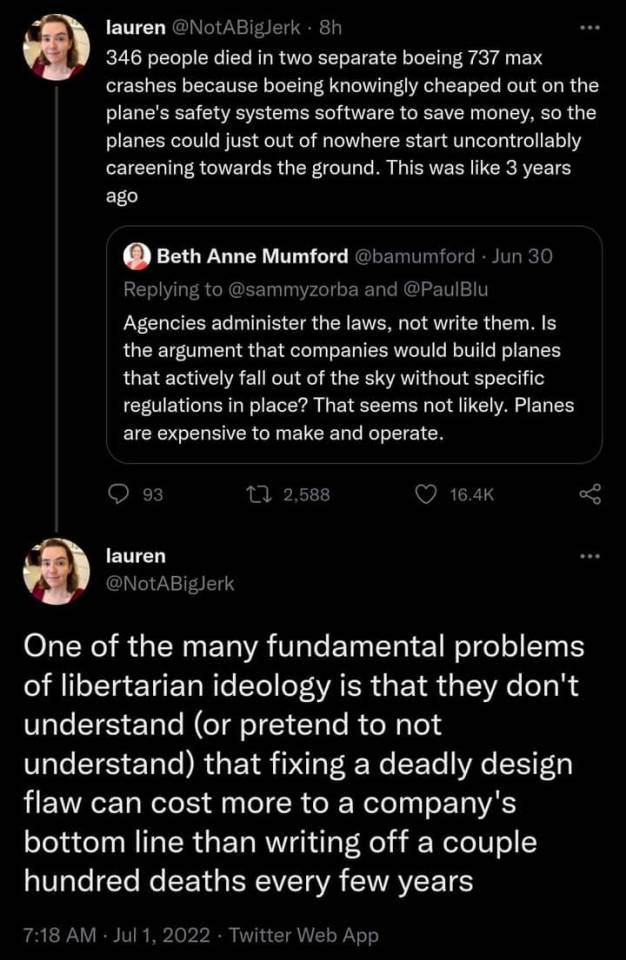
24K notes
·
View notes
Text
Every time I read fandom posts about fictional characters 'deserving' things I'm struck by how culturally Christian ya'll are without realizing it
#hmmmmm#how odd to criticize ‘not realizing you’re culturally Christian’#as a problem with critical analysis#and then not actually defend that position with thorough critical analysis#the embedded assumption (the part that needs more critical analysis)#is that applying ‘real life morals’ indiscriminately to the plot or characters of a story#that is#without thought to the integrity (in terms of plot holes or motivations) continuity or clarity of the work#can be a disservice to the story’s stand-alone merit#and applying this type of not-nuanced analysis#is specifically something you do because you’re a Christian culturally and don’t know it#do morals exist outside of Christianity?#is Christianity the only culture you can be if you’re applying these types of not-nuanced analyses to stories#that might benefit from examination outside of or only in loose conjunction with#secular morality?#anyway
31K notes
·
View notes


